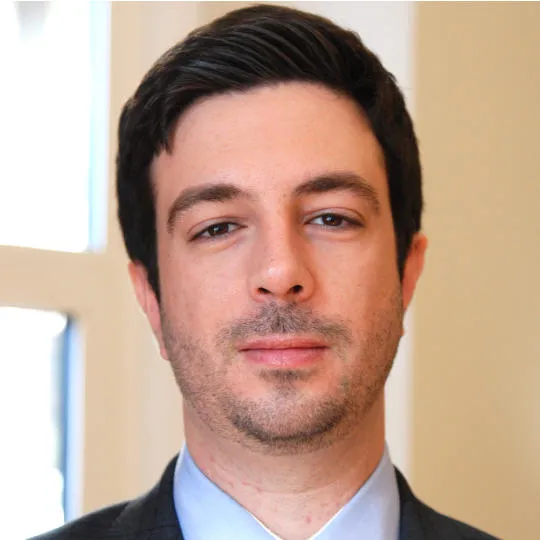
Antônio Sampaio
PhD Student
Research interests
- Security
- Conflict
- History
- International relations
- Strategy
Biography
Antônio is a PhD Candidate at the War Studies Department in King’s College London. He also works as Thematic Lead for Cities & Illicit Economies at the Global Initiative Against Transnational Organized Crime, conducting and coordinating research on urban violence, governance and the linkage between urbanization and security. Prior to this, Antônio worked for over nine years at the International Institute for Strategic Studies (IISS), in London, most recently as a Research Fellow.
Antônio’s research has focused on drivers and implications of armed violence and non-state armed groups in cities. His work has been particularly focused on cities in Latin America (particularly Brazil and Colombia), as well as Somalia, Afghanistan and Pakistan. He has authored peer-reviewed articles for Third World Thematics, the International Review of the Red Cross and the Journal of Illicit Economies and Development. Antônio has published on various topics related to urban violence in popular outlets such as The Washington Post, Financial Times, Foreign Policy and War on the Rocks. He has also advised NATO as part of a project on responses to urban warfare.
Antônio has an MA (with distinction) from the War Studies Department at King’s and a BA in Journalism from PUC in Rio de Janeiro. He has also worked as a journalist at Globo News TV in Rio.
Research Interests
- Armed violence in the urban space
- The roles of urban areas in armed conflicts
- Hybrid governance and local political orders involving armed groups
- Links between organized crime and armed conflict
- Urbanisation and security in Sub-Saharan Africa and Latin America
- Urban violence in Brazil
Antônio’s work has focused on different aspects of urban violence. He has a particular interest in the political economy of non-state armed groups and violence in urban areas of Africa and Latin America – particularly militias. His current research focuses predominantly on the role of urban areas in conflict economies.
Thesis
Title: The political economy of urban conflict: the lure of urban resources for armed groups and their linkage to political violence
As dense communities concentrating people, industrial and service sectors of economic activity, cities contain very different sources of gain for armed groups in comparison to (mostly) rural-based natural resources. The expanding academic and policy attention to armed conflict in cities has shown that urban areas possess unique features that affect conflict and postconflict dynamics in ways that analyses focusing on broader national, regional or predominantly rural settings may miss. Cities have played central roles in recent armed conflicts, such as the Syrian civil war, the fighting around the key Yemeni port city of Hodeidah, and the proliferation of militias in Libyan cities.
Many of the most rapidly urbanising countries right now are also undergoing armed conflict or are transitioning from it – the cases of Nigeria, Somalia and Afghanistan.
The project examines how non-state armed groups access and utilise urban areas as sources of resources in areas of armed conflict. It examines strategies to extract economic and political benefits from communities and infrastructure located in cities or towns.
Supervisor:
- Dr Kieran Mitton
Publications
- Antônio Sampaio, ‘Urban resources and their linkage to political agendas for armed groups in cities’, Journal of Illicit Economies and Development, Vol. 2, Issue 2, 2021.
- Antônio Sampaio, ‘The role of power for non-state armed groups in cities: marginalised spaces and transitions from armed conflict’, Third World Thematics, 4 (2-3), 2019.
- Antonio Sampaio, ‘Before and after Urban Warfare: Conflict Prevention and Transitions in Cities’, International Review of the Red Cross 98 (1), 2016, pp. 71–95.
Policy papers:
- Antônio Sampaio, Aziz Mossi, Eleanor Beevor and Emmanuel N Sambieni, ‘Reserve assets: Armed groups and conflict economies in the national parks of Burkina Faso, Niger and Benin’, Global Initiative Against Transnational Organized Crime, May 2023.
- Antônio Sampaio, ‘Conflict economies and urban systems in the Lake Chad Region’, Global Initiative Against Transnational Organized Crime, November 2022.
- Antônio Sampaio, ‘Criminal governance during the pandemic’, Global Initiative Against Transnational Organized Crime, December 2021.
- Antônio Sampaio, ‘Urban drivers of political violence: declining state authority and armed groups in Mogadishu, Nairobi, Kabul and Karachi’, International Institute for Strategic Studies, May 2020.
Book chapter:
- Antonio Sampaio, ‘The utility of Force in Cities: Future Challenges of US Army Urban Stabilization Efforts’, in Scott N. Romaniuk and Francis Grice (eds.), The Future of US Warfare (London: Routledge, 2017).
